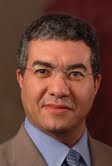Tutorial 1: Monday - August 27, 2012
The Cloud, the Edge & Beneath: Cloud-Sensor Architectures and Optimizations
 |
Abdelsalam (Sumi) Helal
USA
|
|---|---|
Abstract:
Driven by increasing urbanization and serious economic and
Short Biography:
Dr. Abdelsalam (Sumi) Helal is a Professor at the Computer and Information Science and Engineering Department (CISE) at the University of Florida. His research interests span the areas of Pervasive Computing, Mobile Computing and networking and Internet Computing. He directs the Mobile and Pervasive Computing Laboratory at the CISE department, and is co-founder and director of the Gator Tech Smart House, an experimental home for applied research in the domain of elder care. He led the technology development of the NIDRR-funded Rehabilitation Engineering Research Center (RERC) on Successful Aging (2001-2007), and is currently leading a new initiative on smart home based personal health and independence, funded by the National Institutes of Health (NIH). Outside of his teaching and research activities, Dr. Helal is the co-founder and an editorial board member of the IEEE Pervasive Computing magazine. He is Editor of the magazine's column on Standards, Tools and Emerging Technologies. He has been on the editorial board of the IEEE Transaction on Mobile Computing, and currently serves as the Networking Area Chair of IEEE Computer magazine. He has published over 200 books, book chapters, journal articles, and conference or workshop papers. He is a Senior member of the Institute of Electrical and Electronics Engineers (IEEE), and a member of the Association for Computing Machinery (ACM) and the USENIX Association.
|
|